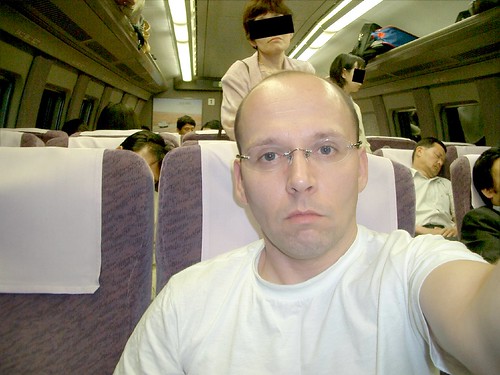Wednesday, August 17, 2005
Do you Prefer to Stand in the Aisle or Sit Next to Fat Gaijin?

This is me on my way to Kyoto. I took this photograph to demonstrate the oft experienced phenomena where I find that there is only one empty seat in a train carriage, next to me, and there are people standing. The effect of this is to make me feel rather lonely and upset, which you may tell from my expression.
I often hear people say that the reason why Japanese do not sit next to me is due to their lack of ability in English. But this does happen when I am reading a Japanese language reading materials (as I usually am when I am on a train).
It also happens to me when I am on seats on subway trains where the seats are at the sides of the train. I have another photograph.
It also happens in lifts, where the shock of seeing a large-male-gaijin in a lift is clear, and has been so great as to encourage people to miss the lift and wait for the next next. (This was a friend of mine who is taller.)
I have also noticed that Japanese women are considerably less inclined to sit next to men, including Japanese men, of my age in general. I personally feel that there is more of a connection between not wanting to sit next to me and not wanting sit next to a middle aged man in general. They are not so scared of inconveniencing me as being inconvenienced themselves.
I think that quite a lot of whites have implicit/subconscious prejudices agains persons of colour, despite their intentions (according to the tests, I have prejudices against whites, despite my intentions).
And in that sense, I think that many whites have an implicit aversions towards sitting next to large black males.
Most prejudice works at a subconscious level. The folks at Harvard have a great programme for demonstrating unconscious prejudices and I am working on a new version that will be able to tell us our prejudices about pretty much anything.
*think,* I am not sure but I think, that the situation in Japan is not all that different to that in the US.
I think that a lot of the reaction has to do with "dread of difference," and that this is what at base motivates both phenomena you mention (personal space and prejudice)
I believe that a lot of whites do feel superior to blacks in terms of morality and intelligence (until the 1950 whites held overt views of this type, and implicit prejudices can be observed from the tests at Harvard University)
However, I think that also Japanese feel superior to whites in morality, cleanliness, and some forms of intelligence (social intelligence) too. (Indeed, I think that I would agree! Oops. No..Whites are nice too!)
As I say, I hope to make the tests to demonstrate Japanese feelings of superiority soon.
However, in both cases I think that these feelings of superiority are fairly insignificant compared to the fear and incomprehension (I think that fear and incomprehension are linked) in the face of that which is different.
We have a gut fear of that which we do not understand. We do not know what aliens will do next. Hence we do not want to work, live, or sit next to them.
While I generally like to come to Japan's defence, I think that whites are not as bad as one may think. White prejudice is pretty much the same as the that felt by the Japanese ladies that do not want to sit next to me.
I think that the feelings of "superiority" are often a secondary reaction in the face of fear. The thought process is:
"Ach, I am scared. But, but, but...I know, I am brainier, better than him."
The feeling of superiority then does go to reinforce the original feeling of fear, and solidify it into mutually reinforcing equations where
The other IS scary/dangerous.
I am better, brainier more moral.
But I think that both start with the fear, and the fear is here, in Japan too.
Labels: japan, japanese culture, nihonbunka, 日本文化
This blog represents the opinions of the author, Timothy Takemoto, and not the opinions of his employer.
